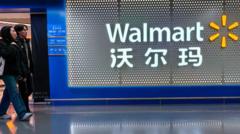The trade war intensifies, with tariffs affecting both economies and global markets.
China Demands US to Abolish Tariffs Amid Ongoing Trade Conflict

China Demands US to Abolish Tariffs Amid Ongoing Trade Conflict
Chinese officials urge a complete end to US reciprocal tariffs as trade tensions persist.
China's Ministry of Commerce has reiterated its call for US President Donald Trump to "completely cancel" the reciprocal tariffs that have characterized the ongoing trade conflict between the two superpowers. This demand comes as the US pauses tariffs for 90 days but has also raised duties on Chinese imports to staggering 145%. Officials in Beijing stressed the importance of rectifying what they view as a fundamental misstep by the US and urged a return to a trading relationship based on mutual respect.
While some technological products manufactured in China were granted exemptions, regarded as a minor concession by the Trump administration, the Chinese government is currently assessing the potential impacts of these measures. Notable exemptions include smartphones, computers, and semiconductors, which aim to alleviate the financial strain on American consumers and technology companies concerned about escalating prices.
Despite this small step toward addressing the situation, communication between the two nations remains strained. US Trade Representative Jamieson Greer confirmed on CBS's Face the Nation that there are no current plans for direct discussions between Trump and Chinese President Xi Jinping.
The escalating tariff situation has seen initial 54% tariffs on Chinese goods in April, with retaliatory measures from China progressively rising from 34% to an alarming 125%. China has made it clear that it will "fight to the end" against US provocations, indicating a commitment to uphold its position in this contentious trade war.
As developments unfold, Trump continues to frame his tariff strategy as a necessary approach to correct perceived unfairness in the global trading landscape, promising benefits such as the return of jobs to the American economy. However, the policy has resulted in significant volatility within financial markets, raising concerns about its broader implications on global trade and local economies.
Trump is expected to announce further details surrounding the tariff exemptions while traveling to Miami, Florida, as both countries navigate this complex economic landscape.
While some technological products manufactured in China were granted exemptions, regarded as a minor concession by the Trump administration, the Chinese government is currently assessing the potential impacts of these measures. Notable exemptions include smartphones, computers, and semiconductors, which aim to alleviate the financial strain on American consumers and technology companies concerned about escalating prices.
Despite this small step toward addressing the situation, communication between the two nations remains strained. US Trade Representative Jamieson Greer confirmed on CBS's Face the Nation that there are no current plans for direct discussions between Trump and Chinese President Xi Jinping.
The escalating tariff situation has seen initial 54% tariffs on Chinese goods in April, with retaliatory measures from China progressively rising from 34% to an alarming 125%. China has made it clear that it will "fight to the end" against US provocations, indicating a commitment to uphold its position in this contentious trade war.
As developments unfold, Trump continues to frame his tariff strategy as a necessary approach to correct perceived unfairness in the global trading landscape, promising benefits such as the return of jobs to the American economy. However, the policy has resulted in significant volatility within financial markets, raising concerns about its broader implications on global trade and local economies.
Trump is expected to announce further details surrounding the tariff exemptions while traveling to Miami, Florida, as both countries navigate this complex economic landscape.





















